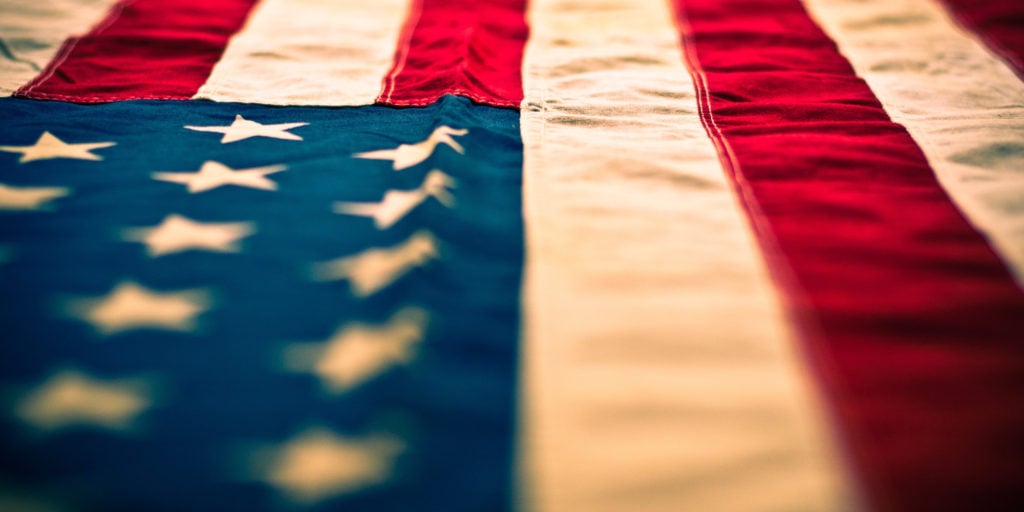
Donald Trump’s election as President signals, in Walter Russell Mead’s term, a “Jacksonian protest”, of nativist sentiment and mistrust of elites. Meanwhile, similar sentiments are rising in other nations, so that Greg Ip discerns an ideological conflict of globalism against nationalism. A world of nationalists rejecting globalism seems also to reject the liberal order that has kept peace and prosperity. Many worry that it could slide into economic decline, international suspicion, and war. Many fear for the global condition of rights and the rule of law.
The United States can forestall such consequences, and more, and not in spite of American nationalism. We remain the most powerful nation in the world. We can promote the global spread of individual rights by deploying that power, pointedly and coherently, to embody America’s national essence.
For this to occur, American politics would have to reach some degree of consensus. which looks highly improbable today. However, that very national essence offers the best logical base on which to build a moral center.
The American nation was founded on an abstract article of faith, that all persons have inherent rights. The signers of the Declaration of Independence divorced their ethnic ties, and ignored other markers of identity in favor of this principle; the bulk of the document argues that Britain had violated it. The principle, and the corollary that governments exist to secure the unalienable rights and so must have the consent of the governed, make up America’s founding creed.
The United States’ legitimacy rests on our validation of that creed. To embody it successfully, then, is the core of our national interest. That interest corresponds to our unusual, not to say exceptional, nationalism.
This unusual nationalism lays down a simple dual mandate for our leaders: to protect the freedom we enjoy and its essential conditions, on the one hand; and to express our creed in our conduct, on the other. Any political outcome that meets those demands fulfills the mandate. No particular ‘isms’ need be served, no current commitments or interests require our compliance unless this mandate does, and it is particularly open to new and even radical ideas, if they fit our purpose.
Henry Nau argues that America’s is an “International Nationalism”, citing a plethora of actions throughout our history. And we are accustomed to the idea that America did act in its nature in promulgating the post-World War II liberal world order.
But our founding on principle does not automatically tie us to the current liberal world order, or any particular mechanism or policy, or role in world affairs. Future embodiment of our creed probably will not come through familiar channels.
As Michael Mazarr says, ‘doubling down” on current mechanisms may only exacerbate their failings. Ip calls for globalists to recognize their neglect of peoples’ nationalistic needs. Mead notes how Wilsonians and Hamiltonians assume their views of American interest demand intervention abroad. Some of those fuel the Jacksonian protest, and may be unnecessary. Walter McDougall sees a century-old “civic religion” of intervention that weakens our grasp of our basic values.
Any President, including President Trump, could set policy to express America’s creed. In this case, a transactional President and a Secretary of State with a deal-making history will benefit if day to day diplomacy sets America’s creed as the backdrop to their initiatives. It could start—though certainly would not end—with a Presidential pronouncement that that creed indeed defines his deepest purpose. Working level policy guidance to this effect, and a formative regimen steeping U.S. diplomats in our creed, could cement the statement into a norm.
Administration opponents can help American conduct voice our principles, with or without Presidential action, by declaring the creed as their own ultimate purpose. Followed up sincerely, this casts disagreements with the administration as differences over interpretation or policy execution, while implying the common fundamental ends.
Either step seems unlikely. Only nuanced public discourse on the creed will keep the inevitable political posturing from reducing our creed to one more claim of partisan rhetoric. And the best ways to express our nationality may point toward novel and risky channels. But only by understanding the creed as America’s basic source of values will we build a base for our national moral narrative.
As of this writing the administration’s rapid measures to fulfill campaign promises unsettles many; it also reinforces the partisan divisions of political discourse. Once the immediate actions and reactions have played out, the question is whether anyone will focus on America’s fundamental nature.